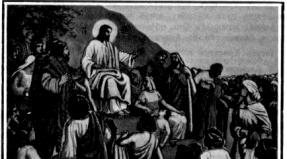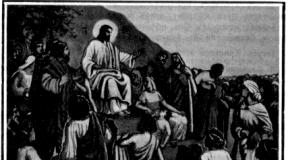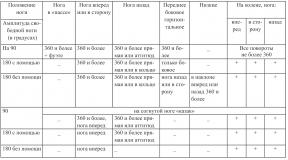Main sections of an accountant's job description. Job responsibilities of an accountant
(name of company,
enterprises, etc., his (last name, initials)
organizational and legal form) _________________________
(director or other
executive,
authorized
approve official
instructions)
" " _____________ 20__
Job description
accountant
______________________________________________
(name of organization, enterprise, etc.)
" " ______________ 20__ N_________
1. General Provisions
1.1. This job description defines the functional duties, rights and responsibilities of the Accountant.
1.2. An accountant is appointed and dismissed in accordance with the procedure established by current labor legislation by order of the director of the Enterprise.
1.3. The accountant reports directly to the Chief Accountant of the enterprise.
1.4. A person with a higher economic or secondary specialized education and work experience in the specialty of at least 1 (one) year is appointed to the position of Accountant.
1.5. An accountant must know:
- legislation on accounting;
- resolutions, orders, orders, other guiding, methodological and regulatory materials of higher, financial and control and audit bodies on the organization of accounting and reporting, as well as those relating to the economic and financial activities of the enterprise;
- civil law, financial, tax and economic legislation;
- structure of the enterprise, strategy and prospects for its development;
- regulations and instructions for organizing accounting at an enterprise, rules for its maintenance;
- the procedure for processing transactions and organizing document flow for accounting areas;
- forms and procedures for financial settlements;
- methods of economic analysis of the economic and financial activities of an enterprise, identifying intra-economic reserves;
- the procedure for conducting cash transactions, the procedure for recording the movement of inventory items;
- rules for settlements with debtors and creditors;
- taxation conditions for legal entities and individuals;
- the procedure for writing off shortages, receivables and other losses from accounting accounts;
- rules for conducting inventories of funds and inventory items;
- the procedure and timing for drawing up balance sheets and reporting;
- rules for conducting inspections and documentary audits;
- advanced domestic and foreign experience in improving the organization of accounting;
- economics, organization of production, labor and management;
- basics of production technology;
- market methods of management;
- labor legislation;
- labor protection rules and regulations.
1.6. An accountant must have computer skills at the level of a confident user and computer programs for accounting.
1.7. During the temporary absence of the Accountant, his duties are assigned to _____________.
2. Functional responsibilities
2.1. Accountant:
2.1.1. Performs work in assigned area of accounting work.
2.1.2. Reflects cash flows in primary accounting documents.
2.1.3. Controls the movement of funds in the bank accounts of the enterprise.
2.1.4. Prepares payment orders and submits them to the bank in a timely manner.
2.1.5. Monitors the timeliness and correctness of the receipt and write-off of funds, the preparation of cash and other cash reports.
2.1.6. Calculates payments under lease agreements, monitors the accuracy and timeliness of payments.
2.1.7. Ensures the safety of accounting documents.
2.1.8. Prepares accounting documents for transfer to the archive.
2.1.9. Participates in conducting inventories.
2.1.10. Replaces absent accountants.
2.1.11. Complies with labor and production discipline, labor protection rules and regulations, industrial sanitation and hygiene requirements, fire safety requirements, and civil defense.
2.1.14. Executes the orders of the Chief Accountant.
2.1.15. In case of operational necessity, by order of the Director, he may be assigned to perform other duties with an indication of the deadline for their execution and monetary compensation.
3. Rights
3.1. The accountant has the right:
3.1.1. Require the provision of materials and documents necessary to fulfill the duties assigned to him
3.1.2. Make proposals to the enterprise administration for improving work related to the functional responsibilities of the Accountant and the entire enterprise as a whole.
4. Responsibility
4.1. The accountant, within the limits determined by the current labor legislation, is responsible for:
4.1.1. Failure to fulfill one's functional duties.
4.1.2. Failure to comply with orders, instructions and instructions from the immediate management and administration of the enterprise.
4.1.3. Failure to comply with labor discipline, violation of internal labor regulations, fire safety and safety regulations established at the enterprise.
4.1.4. For failure to preserve or damage goods and other material assets, if failure or damage occurred through the fault of the Accountant.
4.1.5. For disclosure of information constituting an official or commercial secret.
5. Working conditions
5.1. The Accountant's work schedule is determined in accordance with the Internal Labor Regulations established in the Department.
5.2. Due to operational needs, by order of the Director with the consent of the Chief Accountant, the Accountant may be sent on business trips (including local ones).
I have read the instructions: "___ "_____ ____20__
______________ ____________________
(signature) (full name)
I. General provisions
1. An accountant belongs to the category of specialists.
2. For the position:
A person is appointed as an accountant; a person is appointed who has a secondary vocational (economic) education without presenting requirements for work experience or special training according to an established program and work experience in accounting and control of at least 3 years;
Accountant of category II - a person who has a higher professional (economic) education without presenting requirements for work experience or secondary vocational (economic) education and work experience as an accountant for at least 3 years;
3. Appointment to and dismissal of an accountant is made by order of the director of the enterprise upon the recommendation of the chief accountant.
4. An accountant must know:
4.1. Legislative acts, resolutions, orders, orders, other guidance, methodological and regulatory materials on the organization of accounting of property, liabilities and business transactions and reporting.
4.2. Forms and methods of accounting at an enterprise.
4.3. Plan and correspondence of accounts.
4.4. Organization of document flow in accounting areas.
4.5. The procedure for documenting and reflecting on accounting accounts transactions related to the movement of fixed assets, inventory and cash.
4.6. Methods of economic analysis of economic and financial activities of an enterprise.
4.8. Rules for the operation of computer equipment.
4.9. Fundamentals of economics, labor organization and management.
4.10. Market methods of management.
4.11. Labor legislation.
4.12. Internal labor regulations.
4.13. Labor protection rules and regulations.
5. An accountant in his work is guided by:
5.1. Regulations on the accounting department of the organization.
5.2. This job description.
6. The accountant reports directly to the chief accountant of the organization or the head of the corresponding structural unit of the main accounting department.
7. During the absence of an accountant (vacation, illness, etc.), his duties are performed by a person appointed in the prescribed manner, who acquires the corresponding rights and is responsible for the quality and timeliness of fulfillment of the duties assigned to him.
II. Job responsibilities
Accountant:
1. Performs work on maintaining accounting records of property, provides accounting support for individual entrepreneurs, obligations and business operations (accounting for fixed assets, inventory, production costs, sales of products, results of economic and financial activities; settlements with suppliers and customers for provided services, etc.).
2. Participates in the development and implementation of activities aimed at maintaining financial discipline and rational use of resources.
3. Receives and controls primary documentation for the relevant areas of accounting and prepares them for accounting processing.
4. Reflects on the accounting accounts transactions related to the movement of fixed assets, inventory and cash.
5. Compiles reporting estimates of the cost of products (works, services), identifies sources of losses and unproductive expenses, and prepares proposals for their prevention.
6. Accrues and transfers taxes and fees to the federal, regional and local budgets, contributions to state extra-budgetary social funds, payments to banking institutions, funds to finance capital investments, wages of workers and employees, other payments and payments, as well as deductions funds for material incentives for employees of the enterprise.
7. Participating:
7.1. In conducting an economic analysis of the economic and financial activities of an organization based on accounting and reporting data in order to identify intra-economic reserves, implement savings regimes and measures to improve document flow.
7.2. In the development and implementation of progressive forms and methods of accounting based on the use of modern computer technology.
7.3. Conducting inventories of cash, inventory, settlements and payment obligations.
8. Provides managers, creditors, investors, auditors and other users of financial statements with comparable and reliable accounting information in the relevant areas (areas) of accounting.
9. Develops a working chart of accounts, forms of primary documents used for registration of business transactions for which standard forms are not provided, as well as forms of documents for internal accounting reporting, participates in determining the content of basic techniques and methods of accounting and technology for processing accounting information.
10. Prepares data on the relevant areas of accounting for reporting, monitors the safety of accounting documents, draws them up in accordance with the established procedure for transfer to the archive.
11. Performs work on the formation, maintenance and storage of a database of accounting information, makes changes to reference and regulatory information used in data processing.
12. Participates in the formulation of the economic formulation of problems or their individual stages, solved with the help of computer technology, determines the possibility of using ready-made projects, algorithms, application software packages that allow the creation of economically sound systems for processing economic information.
13. Performs individual official assignments of his immediate superior.
III. Rights
The accountant has the right:
1. Get acquainted with the draft decisions of the enterprise management concerning its activities.
2. Make proposals for improving work related to the responsibilities provided for in these instructions.
3. Within the limits of your competence, inform your immediate supervisor about all shortcomings identified in the course of your activities and make proposals for their elimination.
4. Request personally or on behalf of the chief accountant from heads of departments and specialists information and documents necessary to fulfill his official duties.
5. Involve specialists from all (individual) structural divisions in solving the tasks assigned to him (if this is provided for by the regulations on structural divisions, if not, then with the permission of the manager).
6. Demand that the management of the enterprise provide assistance in the performance of their official duties and rights.
IV. Responsibility
The accountant is responsible for:
1. For improper performance or failure to fulfill one’s job duties provided for in this job description - within the limits determined by the current labor legislation of the Russian Federation.
2. For offenses committed in the course of carrying out their activities - within the limits determined by the current administrative, criminal and civil legislation of the Russian Federation.
3. For causing material damage - within the limits determined by the current labor and civil legislation of the Russian Federation.
We bring to your attention a typical example of an accountant's job description, sample 2019. Accountant job description should include the following sections: general regulations, job responsibilities of an accountant, rights of an accountant, responsibility of an accountant.
The accountant's job description should reflect the following points:
Job responsibilities of an accountant
1) Job responsibilities. Performs work on maintaining accounting records of property, liabilities and business operations (accounting for fixed assets, inventory, production costs, sales of products, results of economic and financial activities, settlements with suppliers and customers, as well as for services provided, etc. .). Participates in the development and implementation of activities aimed at maintaining financial discipline and rational use of resources. Receives and controls primary documentation for the relevant areas of accounting and prepares them for accounting processing. Reflects on the accounting accounts transactions related to the movement of fixed assets, inventory and cash. Prepares reporting estimates of the cost of products (works, services), identifies sources of losses and unproductive costs, and prepares proposals for their prevention. Accrues and transfers taxes and fees to the federal, regional and local budgets, insurance contributions to state extra-budgetary social funds, payments to banking institutions, funds to finance capital investments, wages of workers and employees, other payments and payments, as well as deductions for material incentives for enterprise employees. Provides managers, creditors, investors, auditors and other users of financial statements with comparable and reliable accounting information in the relevant areas (areas) of accounting. Develops a working chart of accounts, forms of primary documents used for registration of business transactions for which standard forms are not provided, as well as forms of documents for internal accounting reporting, participates in determining the content of basic techniques and methods of accounting and technology for processing accounting information.
An accountant should know
2) When performing his duties, an accountant must know: legislative acts, regulations, orders, orders, guidelines, methodological and regulatory materials on organizing accounting of property, liabilities and business transactions and reporting; forms and methods of accounting at the enterprise; plan and correspondence of accounts; organization of document flow in accounting areas; the procedure for documenting and reflecting on accounting accounts transactions related to the movement of fixed assets, inventory and cash; methods of economic analysis of the economic and financial activities of an enterprise; rules for operating computer equipment; economics, labor organization and management; market methods of management; labor legislation; rules and regulations of labor protection.
Qualification requirements for an accountant
3) Qualification requirements.
Accountant category II: higher professional (economic) education without requirements for work experience or secondary vocational (economic) education and work experience as an accountant for at least 3 years.
Accountant: secondary vocational (economic) education without requirements for work experience or special training according to an established program and work experience in accounting and control of at least 3 years.
1. General Provisions
1. An accountant belongs to the category of specialists.
2. A person who has a higher professional (economic) education and work experience as an accountant of category II for at least 3 years is accepted for the position of category I accountant;
- category II accountant - a person who has a higher professional (economic) education without presenting requirements for work experience or secondary vocational (economic) education and work experience as an accountant for at least 3 years;
- accountant - a person who has a secondary vocational (economic) education without requirements for work experience or special training according to an established program and work experience in accounting and control of at least 3 years.
3. An accountant is hired and dismissed by the director of the organization.
4. An accountant must know:
- legislative acts, regulations, orders, orders, guidelines, methodological and regulatory materials on organizing accounting of property, liabilities and business transactions and reporting;
- forms and methods of accounting at the enterprise;
- plan and correspondence of accounts;
- organization of document flow in accounting areas;
- the procedure for documenting and reflecting on accounting accounts transactions related to the movement of fixed assets, inventory and cash;
- methods of economic analysis of the economic and financial activities of an enterprise;
- rules for operating computer equipment;
- economics, labor organization and management;
- market methods of management;
- labor legislation;
- internal labor regulations;
- rules and regulations of labor protection, safety precautions, industrial sanitation and fire protection.
5. In his activities, the accountant is guided by:
- legislation of the Russian Federation,
- Charter of the organization,
- orders and instructions of employees to whom he is subordinate in accordance with these instructions,
- this job description,
- Internal labor regulations of the organization.
6. The accountant reports directly to the chief accountant.
7. During the absence of an accountant (business trip, vacation, illness, etc.), his duties are performed by a person appointed by the director of the organization in the prescribed manner, who acquires the corresponding rights, obligations and is responsible for the performance of the duties assigned to him.
2. Job responsibilities of an accountant
Accountant:
1. Performs work on maintaining accounting records of property, liabilities and business transactions (accounting for fixed assets, inventory items, production costs, sales of products, results of economic and financial activities, settlements with suppliers and customers, as well as for services provided, etc. .P.).
2. Participates in the development and implementation of activities aimed at maintaining financial discipline and rational use of resources.
3. Receives and controls primary documentation for the relevant areas of accounting and prepares them for accounting processing.
4. Reflects on the accounting accounts transactions related to the movement of fixed assets, inventory and cash.
5. Compiles reporting estimates of the cost of products (works, services), identifies sources of losses and unproductive costs, and prepares proposals for their prevention.
6. Accrues and transfers taxes and fees to the federal, regional and local budgets, insurance contributions to state extra-budgetary social funds, payments to banking institutions, funds to finance capital investments, wages of workers and employees, other payments and payments, as well as deductions funds for material incentives for employees of the enterprise.
7. Provides managers, creditors, investors, auditors and other users of financial statements with comparable and reliable accounting information in the relevant areas (areas) of accounting.
8. Develops a working chart of accounts, forms of primary documents used for registration of business transactions for which standard forms are not provided, as well as forms of documents for internal accounting reporting, participates in determining the content of basic techniques and methods of accounting and technology for processing accounting information.
9. Participates in conducting an economic analysis of the economic and financial activities of the enterprise based on accounting and reporting data in order to identify on-farm reserves, implement savings regimes and measures to improve document flow, in the development and implementation of progressive forms and methods of accounting based on the use of modern computer technology , in conducting inventories of funds and inventory items.
10. Prepares data on the relevant areas of accounting for reporting, monitors the safety of accounting documents, draws them up in accordance with the established procedure for transfer to the archive.
11. Performs work on the formation, maintenance and storage of a database of accounting information, makes changes to reference and regulatory information used in data processing.
12. Participates in the formulation of the economic formulation of problems or their individual stages, solved with the help of computer technology, determines the possibility of using ready-made projects, algorithms, application software packages that allow the creation of economically sound systems for processing economic information.
13. Complies with the internal labor regulations and other local regulations of the organization.
14. Complies with internal rules and regulations of sales, safety, industrial sanitation and fire protection.
15. Ensures cleanliness and order in his workplace,
16. Carry out, within the framework of the employment contract, the orders of the employees to whom he is subordinate in accordance with these instructions.
3. Rights of an accountant
The accountant has the right:
1. Submit proposals for consideration by the director of the organization:
- to improve work related to the responsibilities provided for in this instruction,
- on the encouragement of distinguished employees subordinate to him,
- on bringing to material and disciplinary liability the employees subordinate to him who violated production and labor discipline.
2. Request from structural divisions and employees of the organization the information necessary for him to perform his job duties.
3. Get acquainted with the documents defining his rights and responsibilities for his position, criteria for assessing the quality of performance of official duties.
4. Get acquainted with the draft decisions of the organization’s management relating to its activities.
5. Require the management of the organization to provide assistance, including ensuring organizational and technical conditions and execution of the established documents necessary for the performance of official duties.
6. Other rights established by current labor legislation.
4. Accountant's responsibility
The accountant is responsible in the following cases:
1. For improper performance or failure to fulfill one’s job duties provided for in this job description - within the limits established by the labor legislation of the Russian Federation.
2. For offenses committed in the course of their activities - within the limits established by the current administrative, criminal and civil legislation of the Russian Federation.
3. For causing material damage to the organization - within the limits established by the current labor and civil legislation of the Russian Federation.
Accountant job description - sample 2019. Job responsibilities of an accountant, rights of an accountant, responsibility of an accountant.
Tags for material: Sample job description of an accountant, job description of an accountant 2017, job description of an accountant 2016, job description of an accountant sample 2016, job description of an accountant LLC, job description of an accountant LLC sample, job description of an enterprise accountant, job description of an accountant 2015, example of an accountant job description , accountant job description download sample, standard accountant job description, ready-made accountant job description, example of a chief accountant job description, how to fill out an accountant job description, job description for an accountant.
I. General provisions
1. An accountant belongs to the category of specialists.
2. For the position:
A person is appointed as an accountant; a person is appointed who has a secondary vocational (economic) education without presenting requirements for work experience or special training according to an established program and work experience in accounting and control of at least 3 years;
Accountant of category II - a person who has a higher professional (economic) education without presenting requirements for work experience or secondary vocational (economic) education and work experience as an accountant for at least 3 years;
3. Appointment to and dismissal of an accountant is made by order of the director of the enterprise upon the recommendation of the chief accountant.
4. An accountant must know:
4.1. Legislative acts, resolutions, orders, orders, other guidance, methodological and regulatory materials on the organization of accounting of property, liabilities and business transactions and reporting.
4.2. Forms and methods of accounting at an enterprise.
4.3. Plan and correspondence of accounts.
4.4. Organization of document flow in accounting areas.
4.5. The procedure for documenting and reflecting on accounting accounts transactions related to the movement of fixed assets, inventory and cash.
4.6. Methods of economic analysis of economic and financial activities of an enterprise.
5. An accountant in his work is guided by:
5.1. Regulations on the accounting department of the organization.
5.2. This job description.
II. Job responsibilities
Accountant:
1. Performs work on maintaining accounting records of property, liabilities and business operations (accounting for fixed assets, inventory, production costs, sales of products, results of economic and financial activities; settlements with suppliers and customers, for services provided, etc. .).
2. Participates in the development and implementation of activities aimed at maintaining financial discipline and rational use of resources.
3. Receives and controls primary documentation for the relevant areas of accounting and prepares them for accounting processing.
4. Reflects on the accounting accounts transactions related to the movement of fixed assets, inventory and cash.
5. Compiles reporting estimates of the cost of products (works, services), identifies sources of losses and unproductive expenses, and prepares proposals for their prevention.
6. Accrues and transfers taxes and fees to the federal, regional and local budgets, contributions to state extra-budgetary social funds, payments to banking institutions, funds to finance capital investments, wages of workers and employees, other payments and payments, as well as deductions funds for material incentives for employees of the enterprise.
7. Participating:
7.1. In conducting an economic analysis of the economic and financial activities of an organization based on accounting and reporting data in order to identify intra-economic reserves, implement savings regimes and measures to improve document flow.
7.2. In the development and implementation of progressive forms and methods of accounting based on the use of modern computer technology.
7.3. Conducting inventories of cash, inventory, settlements and payment obligations.
8. Provides managers, creditors, investors, auditors and other users of financial statements with comparable and reliable accounting information in the relevant areas (areas) of accounting.
9. Develops a working chart of accounts, forms of primary documents used for registration of business transactions for which standard forms are not provided, as well as forms of documents for internal accounting reporting, participates in determining the content of basic techniques and methods of accounting and technology for processing accounting information.
10. Prepares data on the relevant areas of accounting for reporting, monitors the safety of accounting documents, draws them up in accordance with the established procedure for transfer to the archive.
11. Performs work on the formation, maintenance and storage of a database of accounting information, makes changes to reference and regulatory information used in data processing.
12. Participates in the formulation of the economic formulation of problems or their individual stages, solved with the help of computer technology, determines the possibility of using ready-made projects, algorithms, application software packages that allow the creation of economically sound systems for processing economic information.
13. Performs individual official assignments of his immediate superior.
III. Rights
The accountant has the right:
1. Get acquainted with the draft decisions of the enterprise management concerning its activities.
2. Make proposals for improving work related to the responsibilities provided for in these instructions.
3. Within the limits of your competence, inform your immediate supervisor about all shortcomings identified in the course of your activities and make proposals for their elimination.
4. Request personally or on behalf of the chief accountant from heads of departments and specialists information and documents necessary to fulfill his official duties.
5. Involve specialists from all (individual) structural divisions in solving the tasks assigned to him (if this is provided for by the regulations on structural divisions, if not, then with the permission of the manager).
6. Demand that the management of the enterprise provide assistance in the performance of their official duties and rights.
IV. Responsibility
The accountant is responsible for:
1. For improper performance or failure to fulfill one’s job duties provided for in this job description - within the limits determined by the current labor legislation of the Russian Federation.
2. For offenses committed in the course of carrying out their activities - within the limits determined by the current administrative, criminal and civil legislation of the Russian Federation.
3. For causing material damage - within the limits determined by the current labor and civil legislation of the Russian Federation.
The profession of an accountant is one of the most in demand professions in the field of economics and finance today. Any company, even the smallest one, must have an accountant position, since this specialist calculates salaries, calculates wages for employees, calculates tax deductions, product costs, and processes invoices from suppliers and subcontractors.
Typically, in companies that can afford to employ several specialists, accountants work in certain areas - one is responsible for the cash register and payroll, the second works with foreign exchange transactions, the third deals with the warehouse and finished products, etc. The chief accountant is responsible for all accounting and its proper maintenance. As a rule, it is the chief accountant who bears the entire burden of responsibility for the preparation of tax and financial reports, for the financial transactions of the company, competent accounting and for the financial activities of the company as a whole. This is always a qualified specialist who knows all the intricacies of tax and financial legislation, accounting and tax policy, and he enjoys well-deserved respect in the company - the complexity of the chief accountant’s work is accordingly assessed both in his salary and in the bonuses accrued to him.
Places of work
As already mentioned, accountants are needed in every company, firm or organization - in terms of employment, this is an almost win-win profession.
History of the profession
The first accountants were known back in Ancient India - there they were mainly involved in accounting for agricultural activities and were called bookkeepers. Actually, the name of the profession “accountant” appeared in the 15th century with the light hand of Emperor Maximilian, at the same time the first book on accounting appeared - the treatise of the Italian Luca Pacioli “On Accounts and Records”, the first attempt to describe and streamline the functions of an accountant. In Russia, this specialty was introduced by decree of Peter the Great at the beginning of the 18th century. 
Responsibilities of an accountant
In general terms, the job responsibilities of an accountant are as follows:
- Maintaining primary accounting records. Reception, control and processing of primary documentation (invoices, cash registers, personnel documents, contracts with counterparties, etc.)
- Calculation of wages, payments under civil contracts, personal income tax.
- Maintaining tax and management accounting.
- Preparation and submission of tax reports to the funds of the Russian Federation and the tax inspectorate.
- Minimizing tax payments
In addition, the responsibilities of an accountant may include, depending on the specifics of the company’s work:
- Interaction with banks and credit organizations;
- Participation in inventories;
- Work with imports, foreign trade activities.
The list of what an accountant does depends largely on the company - if there is only one accountant, then he has to combine several areas of work and also be the chief accountant. If the company has several accountants, responsibilities will be divided between them. 
Requirements for an accountant
Here are the main requirements for an accountant presented by employers:
- Higher specialized education;
- Knowledge of legislation in the field of taxation and accounting, knowledge of the Russian accounting system;
- Citizenship of the Russian Federation (sometimes employers indicate that they are looking for a woman for the position);
- Confident PC skills, knowledge of office programs and 1C;
- 1-2 years of work experience is often required;
- If the employer conducts foreign trade activities, then knowledge of currency and customs legislation, as well as foreign trade documents, is required.
The list of what an accountant must know may change, since his activities are regulated by decrees and regulations of the Ministry of Taxation and the Ministry of Finance, which often change and sometimes contradict each other.

Accountant resume sample
How to become an accountant
To master the skills of an accountant, you need to obtain a higher education in economics, ideally with a degree in Accounting, Analysis and Audit. It is worth saying that usually university graduates begin their careers as assistant accountants - this allows them to gain the necessary experience and polish the knowledge acquired at the university in practice, to understand what and how an accountant actually does. Often the theory taught in universities is outdated or noticeably different from practice, and therefore it will be useful to work as an assistant for 1-2 years before becoming an accountant.
Accountant salary
An accountant's salary ranges from 25 to 80 thousand rubles (the salary of a chief accountant often rises to a high level; the earnings of ordinary specialists rarely exceed 45 thousand rubles). In general, payment depends on the company, region of residence and the characteristics of the specialist’s work. The average salary of an accountant is about 35 thousand rubles; for a chief accountant this figure is higher - about 50 thousand rubles.
Where to get training
In addition to higher education, there are a number of short-term training on the market, usually lasting from a week to a year.
Interregional Academy of Construction and Industrial Complex and its courses in the direction of "".
Modern scientific and technical academy and a number of its courses in the direction of "".



















